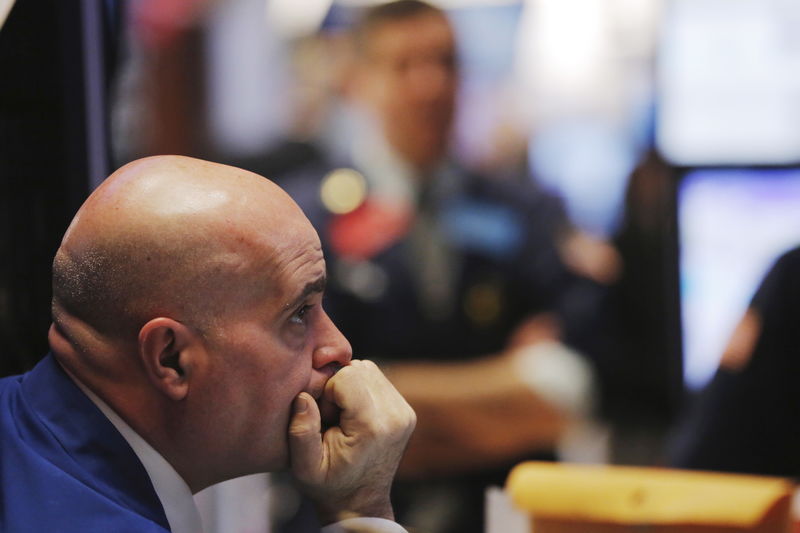© Reuters. Edward Tilly, chairman and CEO of CBOE Global Markets, Inc., speaks during the Piper Sandler Global Exchange and FinTech Conference in New York City, U.S., June 8, 2023. REUTERS/Brendan McDermid/File Photo
By Jaiveer Shekhawat and Laura Matthews
(Reuters) -Cboe Global Markets CEO Edward Tilly has resigned after failing to disclose personal relationships with colleagues, the exchange operator said on Tuesday, bringing his decade of leadership of the company to an abrupt end.
Cboe said board member Fredric Tomczyk, 68 will replace him.
Tilly resigned after an investigation in late August by the board and outside independent counsel found that he did not disclose personal relationships with colleagues, the company said.
Cboe declined to say whether those relations happened while Tilly was CEO or prior to his tenure at the helm. The exchange operator also declined to say what sparked the investigation.
Tilly did not respond to LinkedIn messages seeking comment.
His resignation is the latest in a string of high-profile exits by CEOs whose personal conduct ran afoul of company policy.
“The Board of Directors determined that Tilly did not disclose personal relationships with colleagues, which violated Cboe’s policies and stands in stark contrast to the company’s values,” the company said in a statement.
Cboe shares closed up 2.7%, and are up 24% this year.
Andrew Bond, managing director and senior fintech analyst at Rosenblatt Securities, said he thought the change at the helm was prompting investors to speculate on a change of direction such as the company attracting interest from potential acquirers.
“I think that’s why the stock is higher here,” said Bond.
Owen Lau, senior analyst at Oppenheimer & Co, also said such deal speculation was driving the stock. Lau, however, said hurdles would be Cboe’s $16 billion market capitalization, driven by success in its business strategy and new products such as same-day options or 0DTE, as well as a tougher regulatory environment.
Cboe declined to comment on the stock move.
THROUGH THE RANKS
Tilly joined Cboe as a trading floor clerk in 1987 and rose through the ranks to become CEO in 2013, before which he was president and chief operating offer from November 2011. Prior to that, he served as executive vice chairman from 2006 to 2011.
Under his leadership, Cboe’s stock nearly quadrupled to $157 from $39, LSEG data show. He grew its annual revenues from $572 million to $1.7 billion last year, according to data provided by Rosenblatt’s Bond.
“When he became CEO, he grew that business from a little options exchange to a global, fintech and exchange leader. He really diversified the business. He was there to build an empire,” said Bond.
Steve Sosnick, chief strategist at Interactive Brokers (NASDAQ:), said Tilly did much to make options trading more accessible to the general public.
“Probably the most meaningful move he made for Cboe shareholders was re-upping their exclusive contract with S&P, which gives Cboe a monopoly on an entire suite of key products,” Sosnick said.
Cboe has exclusive rights to list flagship contracts linked to the Standard & Poor’s 500 stock index through 2032.
Tilly’s (NYSE:) total compensation was $11.9 million for 2022. A September 18 filing with U.S. Securities and Exchange Commission shows that Tilly will keep a prorated amount of stock options and performance-based restricted stocks, to be paid out up to his departure.
Tomczyk, who joined Cboe’s board in July 2019, was previously the CEO of TD Ameritrade Holding from 2008 to 2016.
“The silver lining is it doesn’t look like it is related to strategic or financial issue for the company,” Lau said of the CEO resignation. “The Board acts swiftly to resolve this, and new CEO Fredric Tomczyk has lots of experience in this industry.”
Analysts, however said succession planning could be a focus for investors at some point in the future.
Cboe declined comment about succession planning.
“It appears to me the board doesn’t want to make that decision right now,” said Lau. “They want to instill stability for the next two or three more years and then make a decision.”
Read the full article here





